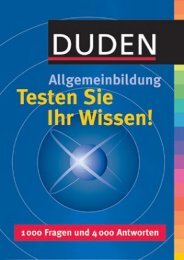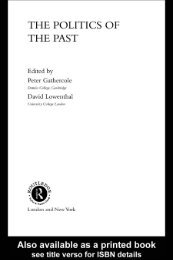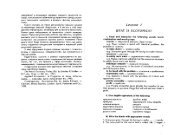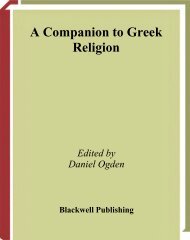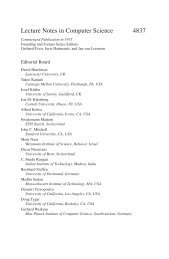LNCS 2950 - Aspects of Molecular Computing (Frontmatter Pages)
LNCS 2950 - Aspects of Molecular Computing (Frontmatter Pages)
LNCS 2950 - Aspects of Molecular Computing (Frontmatter Pages)
Create successful ePaper yourself
Turn your PDF publications into a flip-book with our unique Google optimized e-Paper software.
98 Rodica Ceterchi, Carlos Martín-Vide, and K.G. Subramanian<br />
For L ∈ SSH(1, 3) the result is proved in [8]. For L ∈ SSH(2, 4) the same<br />
pro<strong>of</strong> holds, replacing prefix edge with suffix edge.<br />
According to [7], a language L is strictly locally testable if and only if there<br />
exists a positive integer K such that every string in V ∗ <strong>of</strong> length at least K is a<br />
constant <strong>of</strong> L. Wehavethus:<br />
Corollary 3. (extension <strong>of</strong> Corollary 30.2 <strong>of</strong> [8]) If L is a (1, 3) or a (2, 4)semi-simple<br />
splicing language, then L is strictly locally testable.<br />
5 A Hierarchy <strong>of</strong> Classes <strong>of</strong> Semi-simple Languages<br />
To illustrate the number and variety <strong>of</strong> open problems in this area, let us note<br />
that there is no connection formulated yet between the semi-simple languages<br />
as introduced by Goode and Pixton in [8], and the classes introduced by Tom<br />
Head in [10].<br />
Recall that, inspired by the study <strong>of</strong> simple splicing languages introduced in<br />
[12], Head introduced the families <strong>of</strong> splicing languages {SkH | k ≥−1} using the<br />
null context splicing rules defined in [9]. A splicing rule, according to the original<br />
definition <strong>of</strong> [9], is a sixtuple (u1,x,u2; u3,x,u4) (x is called the cross-over <strong>of</strong> the<br />
rule) which acts on strings precisely as the (Păun type) rule (u1x, u2; u3x, u4).<br />
(For a detailed discussion <strong>of</strong> the three types <strong>of</strong> splicing – definitions given by<br />
Head, Păun, and Pixton – and a comparison <strong>of</strong> their generative power, we send<br />
the reader to [1], [2], [3], [4].)<br />
A null context splicing rule is a rule <strong>of</strong> the particular form (1,x,1; 1,x,1)<br />
(all contexts ui are the empty string 1) and thus will be precisely a rule <strong>of</strong> type<br />
(x, 1; x, 1) with x ∈ V ∗ . Such a rule is identified by Tom Head with the string<br />
x ∈ V ∗ .Forafixedk ≥−1, a splicing system (V,A,R) withrules(x, 1; x, 1) ∈ R<br />
such that |x| ≤k is called an SkH system, and languages generated by an SkH<br />
system are the SkH languages (more appropriately, SkH(1, 3) languages).<br />
Note that the class S1H(1, 3) is precisely the class SH <strong>of</strong> simple H systems<br />
<strong>of</strong> [12].<br />
For k = −1, the S−1H(1, 3) systems are precisely those for which the set <strong>of</strong><br />
rules R is empty. Thus the languages in the class S−1H(1, 3) are precisely the<br />
finite languages, i.e., S−1H(1, 3) = FIN.<br />
For k =0,theS0H(1, 3) systems have either R empty, or R = {(1, 1; 1, 1)}.<br />
Thus infinite languages in the class S0H(1, 3) are generated by H systems <strong>of</strong><br />
the form S =(V,A,{(1, 1; 1, 1)}), with A �= ∅, and it can be easily shown that<br />
L(S) =alph(A) ∗ ,wherealph(A) denotes the set <strong>of</strong> symbols appearing in strings<br />
<strong>of</strong> A.<br />
The union <strong>of</strong> all classes SkH is precisely the set <strong>of</strong> null context splicing languages.<br />
It is shown in [10] that this union coincides with the family <strong>of</strong> strictly<br />
locally testable languages (in the sense <strong>of</strong> [7]). Also from [10] we have the following<br />
result:<br />
Lemma 10. The sequence {SkH(1, 3) | k ≥−1} is a strictly ascending infinite<br />
hierarchy <strong>of</strong> language families for alphabets <strong>of</strong> two or more symbols.



